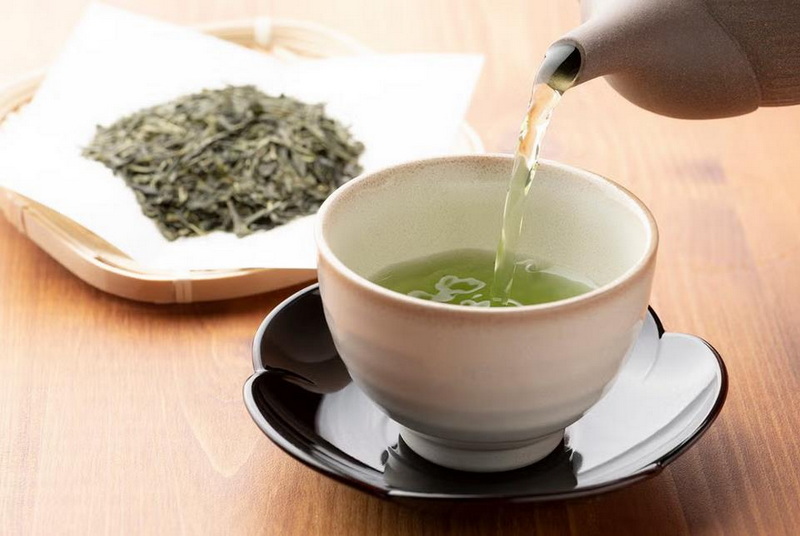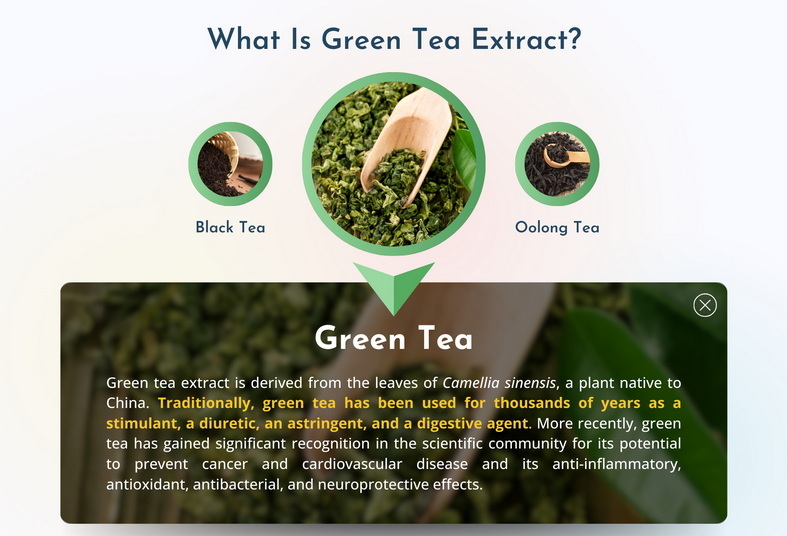Content Menu
● Understanding Diuretics
● Green Tea Extract: Composition and Benefits
>> The Diuretic Effect of Green Tea Extract
>>> Mechanisms Behind Diuretic Activity
>> Evidence from Studies
>> Implications for Health and Wellness
>> Considerations and Precautions
● Additional Benefits of Green Tea Extract
>> Antioxidant Properties
>> Metabolism Boost
>> Cardiovascular Health
>> Cognitive Function
>> Skin Health
● How to Incorporate Green Tea Extract into Your Diet
● Conclusion
● Related Questions
>> 1. What are the side effects of taking too much green tea extract?
>> 2. Can I drink green tea while taking prescription medications?
>> 3. How much caffeine does green tea contain compared to coffee?
>> 4. Can pregnant women consume green tea?
>> 5. How does the antioxidant content in green tea compare with other teas?
● Citations:
Green tea has long been celebrated for its numerous health benefits, but one question that often arises is whether green tea extract acts as a diuretic. This article will delve into the properties of green tea extract, its potential diuretic effects, and the underlying mechanisms that contribute to these effects. We will also explore the implications of these properties for health and wellness.

Understanding Diuretics
Diuretics are substances that promote the excretion of urine. They are commonly used in medicine to help manage conditions such as hypertension, heart failure, and edema by reducing fluid retention in the body. Diuretics can be classified into several categories, including:
- Loop diuretics: Act on the loop of Henle in the kidneys.
- Thiazide diuretics: Work on the distal convoluted tubule.
- Potassium-sparing diuretics: Help retain potassium while promoting urine production.
Natural diuretics, such as herbal extracts and teas, are also popular among those seeking to manage fluid balance without pharmaceuticals.
Green Tea Extract: Composition and Benefits
Green tea extract is derived from the leaves of the "Camellia sinensis" plant and is rich in antioxidants, particularly catechins. The most notable catechin in green tea is epigallocatechin gallate (EGCG), which is credited with many health benefits. Some of these benefits include:
- Antioxidant properties: Protects cells from oxidative stress.
- Weight management: May aid in fat oxidation and weight loss.
- Heart health: Linked to improved cholesterol levels and reduced risk of cardiovascular diseases.
- Blood sugar regulation: Helps manage glucose levels, potentially benefiting those with diabetes.
The Diuretic Effect of Green Tea Extract
Research suggests that green tea extract may have a diuretic effect. A study indicated that green tea increases glomerular filtration rates by enhancing renal blood flow and cardiac output. This increase can lead to greater urine production, thus exhibiting diuretic activity.
Mechanisms Behind Diuretic Activity
1. Caffeine Content: Green tea contains a small amount of caffeine, which is known to have mild diuretic effects. Caffeine stimulates the bladder and can increase urine production.
2. Catechins Influence: The catechins in green tea may affect kidney function by increasing renal blood flow, leading to enhanced urine output. Studies have shown that green tea extract can significantly increase diuretic activity in a dose-dependent manner.
3. Combination with Other Medications: Research has shown that when combined with certain medications like hydrochlorothiazide (a thiazide diuretic), green tea extract can enhance diuretic effects while reducing potassium loss associated with these medications.

Evidence from Studies
Several studies have investigated the diuretic properties of green tea extract:
- One study found that administering aqueous extracts of green tea leaves resulted in increased urine volume in experimental subjects.
- Another study indicated that both high and low doses of green tea extract led to significant increases in urinary sodium excretion, demonstrating its potential as a natural diuretic.
These findings suggest that while green tea extract may not be as potent as pharmaceutical diuretics, it does possess some degree of diuretic activity.
Implications for Health and Wellness
The potential diuretic effects of green tea extract can have various implications for health:
- Weight Loss: Increased urine production may aid in temporary weight loss due to fluid loss; however, this should not be confused with fat loss.
- Fluid Balance: For individuals looking to manage fluid retention or those with conditions requiring careful fluid management, incorporating green tea extract may offer mild benefits.
- Kidney Health: The ability of green tea to promote increased renal blood flow could potentially support kidney function, although more research is needed in this area.
Considerations and Precautions
While green tea extract can offer health benefits, it is essential to consider the following:
- Caffeine Sensitivity: Individuals sensitive to caffeine may experience increased urination or other side effects like jitteriness or insomnia.
- Medication Interactions: Those on diuretics or other medications should consult healthcare professionals before combining them with green tea extract to avoid adverse interactions.
- Excessive Consumption: Drinking excessive amounts of green tea can lead to dehydration due to increased urination; moderation is key.
Additional Benefits of Green Tea Extract
Beyond its potential diuretic effects, green tea extract offers a range of additional health benefits that contribute to overall wellness:
Antioxidant Properties
Green tea extract is rich in polyphenols, particularly catechins, which are powerful antioxidants. These compounds help neutralize free radicals in the body, reducing oxidative stress and lowering the risk of chronic diseases such as cancer and heart disease.
Metabolism Boost
Research has shown that green tea extract can enhance metabolic rate and promote fat oxidation. This effect is particularly beneficial for individuals looking to lose weight or maintain a healthy weight. The combination of caffeine and catechins appears to work synergistically to increase energy expenditure.
Cardiovascular Health
Regular consumption of green tea has been linked to improved cardiovascular health. Studies indicate that it can lower LDL cholesterol levels and improve endothelial function, reducing the risk of heart disease. The anti-inflammatory properties of catechins also contribute to better heart health by preventing arterial plaque buildup.
Cognitive Function
Some research suggests that green tea extract may enhance brain function and protect against neurodegenerative diseases. The presence of L-theanine—a unique amino acid found in green tea—can promote relaxation without drowsiness, potentially improving focus and attention.
Skin Health
The antioxidant properties of green tea extract extend to skin health as well. It has been found to reduce signs of aging, protect against UV damage, and improve skin hydration. Topical applications containing green tea extract are popular for their soothing effects on irritated skin.
How to Incorporate Green Tea Extract into Your Diet
Incorporating green tea extract into your daily routine can be simple and enjoyable:
- Green Tea Beverages: Drinking brewed green tea is one of the easiest ways to enjoy its benefits. Aim for 2–3 cups per day for optimal results.
- Supplements: Green tea extract supplements are available in capsule or powder form. Always choose high-quality products from reputable brands and follow dosage recommendations on the label or consult a healthcare provider.
- Smoothies: Adding matcha powder (a concentrated form of green tea) to smoothies can enhance flavor while providing additional nutrients.
- Cooking: Use powdered green tea or steeped liquid in salad dressings or marinades for an antioxidant boost in meals.
Conclusion
In summary, green tea extract does exhibit mild diuretic properties primarily due to its caffeine content and catechins. While it may not replace traditional diuretics for medical purposes, it can be a beneficial addition to a healthy lifestyle for those looking to manage fluid balance or enhance overall wellness. As always, individuals should consult healthcare professionals before making significant changes to their diet or supplement regimen.

Related Questions
1. What are the side effects of taking too much green tea extract?
Excessive consumption of green tea extract can lead to side effects such as nausea, headaches, insomnia due to caffeine content, liver toxicity at very high doses, and gastrointestinal issues like upset stomach or diarrhea.
2. Can I drink green tea while taking prescription medications?
It's essential to consult your healthcare provider before combining green tea with prescription medications since it may interact with certain drugs, particularly blood thinners or medications metabolized by the liver.
3. How much caffeine does green tea contain compared to coffee?
An 8-ounce cup of brewed green tea typically contains about 20–45 mg of caffeine compared to an 8-ounce cup of brewed coffee which contains approximately 95 mg on average. This makes green tea a milder option for those sensitive to caffeine.
4. Can pregnant women consume green tea?
Moderate consumption (1–2 cups per day) is generally considered safe during pregnancy; however, pregnant women should limit caffeine intake overall and consult their healthcare provider regarding dietary choices during pregnancy.
5. How does the antioxidant content in green tea compare with other teas?
Green tea has one of the highest concentrations of antioxidants among all teas due to its minimal processing compared to black or oolong teas which undergo fermentation processes that reduce catechin levels significantly.
Citations:
[1] https://www.atlantis-press.com/proceedings/icosihsn-19/125919790
[2] https://www.mountsinai.org/health-library/herb/green-tea
[3] https://www.alamy.com/stock-photo/green-tea-extract.html
[4] https://www.youtube.com/watch?v=6-2FJMtvcNA
[5] https://www.healthline.com/nutrition/10-benefits-of-green-tea-extract
[6] https://pmc.ncbi.nlm.nih.gov/articles/PMC4897558/
[7] https://www.webmd.com/vitamins/ai/ingredientmono-960/green-tea
[8] https://www.freepik.com/free-photos-vectors/green-tea-extract
[9] https://www.youtube.com/watch?v=eMuE16vLV_s
[10] https://pubmed.ncbi.nlm.nih.gov/27355016/
[11] https://www.istockphoto.com/de/bot-wall?returnUrl=%2Fde%2Fphotos%2Fgreen-tea-extract
[12] https://timesofindia.indiatimes.com/life-style/health-fitness/photo-stories/peeing-a-lot-after-drinking-green-tea-heres-why/photostory/62129877.cms






























